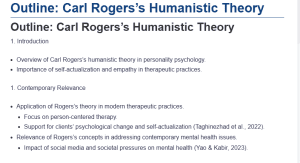Outline: Carl Rogers’s Humanistic Theory
- Introduction
- Overview of Carl Rogers’s humanistic theory in personality psychology.
- Importance of self-actualization and empathy in therapeutic practices.
- Contemporary Relevance
- Application of Rogers’s theory in modern therapeutic practices.
- Focus on person-centered therapy.
- Support for clients’ psychological change and self-actualization (Taghinezhad et al., 2022).
- Relevance of Rogers’s concepts in addressing contemporary mental health issues.
- Impact of social media and societal pressures on mental health (Yao & Kabir, 2023).
III. Real-World Problem of Phenomenon
- Increase in mental health problems linked to societal expectations and social networking.
- Mismatch between real self and ideal self leading to psychological discomfort.
- Rogers’s approach to resolving incongruence through therapeutic relationships.
- Emphasis on empathy, congruence, and unconditional positive regard.
- Modern studies affirming the effectiveness of person-centered therapy in self-image development (Blowers & Haugh, 2021).
- Comparison with Other Theories
- Development of Rogers’s theory in relation to other personality theories, such as Cognitive Behavioral Therapy (CBT).
- Distinction between self-actualization focus in Rogers’s theory and observable actions in CBT.
- Consistent emphasis on personal change and understanding in Rogers’s theory.
- Future Relevance of the Theory
- Potential integration of technology, including artificial intelligence, in therapeutic practices.
- Maintaining focus on empathy and personal development to ensure the ongoing relevance of Rogers’s theory.
References
Blowers, D., & Haugh, S. (2021). Health anxiety and the self-concept: a person-centered/experiential study. Person-Centered & Experiential Psychotherapies, 20(3), 1–16. https://doi.org/10.1080/14779757.2021.1938183
Joseph, S. (2021). How Humanistic Is Positive Psychology? Lessons in Positive Psychology From Carl Rogers’ Person-Centered Approach—It’s the Social Environment That Must Change. Frontiers in Psychology, 12(709789), 1–10. https://doi.org/10.3389/fpsyg.2021.709789
Taghinezhad, F., Mohammadi, E., Khademi, M., & Kazemnejad, A. (2022). Humanistic Care in Nursing: Concept Analysis Using Rodgers’ Evolutionary Approach. Iranian Journal of Nursing and Midwifery Research, 27(2), 83–91. https://doi.org/10.4103/ijnmr.ijnmr_156_21
Yao, L., & Kabir, R. (2023). Person-Centered therapy (Rogerian therapy). PubMed; StatPearls Publishing. https://www.ncbi.nlm.nih.gov/books/NBK589708/
ORDER A PLAGIARISM-FREE PAPER HERE
We’ll write everything from scratch
Question
PROMPT:
Milestone Three is due in this module.

Outline: Carl Rogers’s Humanistic Theory
To complete this assignment, review the following documents (Attached):
- Milestone Three Guidelines and Rubric
- Final Project Guidelines and Rubric
- Milestone Three Template

